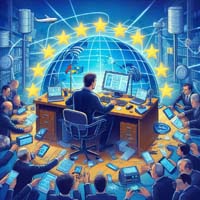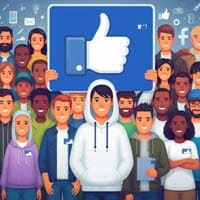Brief History of the Internet: 2010-2015
2010
Sun Sets with Oracle Acquisition
27 January 2010: When Sun settled on its $7.4bn sale to Oracle, it ended an era for a company whose hardware, software, and networking technology laid many of the internet’s foundations. Sun developed Java, a programming language for building web applications and services, and several other important technologies and standards that underpin the modern internet.


Microsoft Launches Azure
1 February 2010: Microsoft Azure accelerated the adoption of cloud computing among businesses, providing the tools and infrastructure – including computing, storage, databases, networking, and AI – they needed to migrate their operations to the cloud. 95% of Fortune 500 companies use Microsoft Azure products and cloud services.
Apple Releases iPad
3 April 2010: The release of the iPad marked a significant milestone in the evolution of personal computing and had a big impact on how businesses and consumers interacted with technology and the internet. The iPad popularised the tablet, bridging the gap between smartphones and laptops, and demonstrated strong demand for portable, touch-based computing devices.


Uber Starts Transport Revolution
5 May 2010: Uber marked a big shift in tech and transportation, introducing a new way to connect passengers with drivers through a mobile app. Since then, Uber has expanded globally. It was valued at $75bn in one of the biggest tech IPOs ever, has 137m monthly active users across its ride-hailing and food-ordering services, and generated $37bn in 2023.
Responsive Web Design Introduced
25 May 2010: Ethan Marcotte’s seminal article “Responsive Web Design” was published. This article is widely credited with introducing and popularising the concept of responsive web design, an approach aimed to make web pages render well on a variety of devices and screen sizes, which has since become a cornerstone of modern web development practices.


Ocado Delivers Strong IPO
21 July 2010: Ocado, the online grocery retailer and technology provider, raised £200m in a noteworthy IPO showcasing the potential of e-commerce in the grocery sector, its ability to disrupt traditional retail, and Ocado’s innovative tech platform for automated warehouses and delivery logistics. Ocado reached 1m customers and achieved revenues of £2.8bn in 2023.
Go for DeepMind
23 September 2010: DeepMind is a research lab that has made major advancements in machine learning and AI, as well as advanced applications in areas such as medical diagnosis and autonomous driving. Its development of AlphaGo, an AI capable of beating human champions in the complex game of Go, garnered international attention. Google acquired it for £400m.
2011

WeChat ‘Superapp’ Launches in China
21 January 2011: WeChat, launched by Chinese tech company Tencent in 2011, is far more than just a messaging app. It is the original ‘Superapp’, a platform offering messaging, social networking, mobile payments, shopping, and more, all within the same app. WeChat has over 1.5bn monthly active users and is an indispensable part of daily life for people in China.
IBM Watson Wins Jeopardy!
14 February 2011: When IBM’s Watson computer defeated the human champions on the quiz show Jeopardy!, it showed the ability of a computer to understand and process human language, interpret complex questions, and retrieve accurate answers from a vast database of unstructured data. This was a major milestone in the field of AI and natural language processing.


WeWork Opens First Space
6 April 2011: WeWork’s Manhattan office was the first of more than 700 co-working spaces where it hoped people and companies would come together and do their best work. Valued in 2019 at $47bn, WeWork – which positioned itself as a tech platform – suffered a spectacular collapse. It struggled through the pandemic after a failed IPO and filed for bankruptcy in 2023.
European Union Adopts Net Neutrality Rules
19 April 2011: The principle that ISPs should treat all internet data equally gained prominence in the early 2000s. The EU’s rules prohibit ISPs from blocking or discriminating against lawful internet traffic but do allow reasonable traffic management practices – such as managing congestion or mitigating security threats – to ensure efficient network operation.


Zoom Founded
21 April 2011: The video conferencing platform Zoom was founded in 2011 but rose to prominence in the early days of the pandemic, when daily meeting participants skyrocketed from 10m to over 300m, and the platform became essential for remote work, virtual meetings, and collaboration. Today, Zoom has more than 200k enterprise customers and 350m daily meeting participants.
LinkedIn Goes Public
19 May 2011: LinkedIn achieved a valuation of $4.25bn when it went public in 2011, validating the concept of social networking for professionals and demonstrating that there was significant value in creating a platform for networking, job hunting, and professional development. LinkedIn has more than 1bn members and over 67m registered companies today.


Justin Timberlake buys MySpace
11 June 2011: After Rupert Murdoch, there was Justin Timberlake. Specific Media Group and Justin Timberlake jointly purchased MySpace for approximately $35m, seeing the potential for a hub for artists, musicians and other content creators to connect with fans and promote their work. They sold MySpace for $87m to publisher Time Inc. in 2016.
Introduction of ‘Li-Fi’
15 July 2011: Professor Harald Haas introduced the concept of Li-Fi, short for Light Fidelity, during his TEDGlobal 2011 talk in Edinburgh. Li-Fi utilises visible light, ultraviolet, and infrared spectrums for data transmission, and has garnered significant interest as a potential alternative to traditional Wi-Fi (which relies on radio waves).


HP Acquires Autonomy
3 October 2011: HP’s $11bn acquisition of Autonomy, a company specialising in enterprise information management, was intended to bolster its software business but ultimately led to controversy. HP went on to sue Autonomy’s founder and former CFO, alleging they had ‘artificially inflated Autonomy’s reported revenues, revenue growth and gross margins’.
Microsoft Buys Skype
13 October 2011: Microsoft’s $8.5bn acquisition of Skype, a company known for its voice and video calling services, marked its entry into the cloud telephony market. Skype changed how people communicated over long distances, offering free or low-cost voice and video calls over the internet and inspiring functionality offered by many leading communication tools today.

2012

Raspberry Pi Launched
29 February 2012: The Raspberry Pi is a low-cost, credit card-sized computer designed to promote computer science education and experimentation. Its affordability, versatility, and community-driven ecosystem have made it a go-to platform for learning, experimentation, and innovation in computing and electronics. More than 57m have been sold since launch.
Facebook Scores Biggest IPO in Tech History
18 May 2012: When Facebook went public, it did so with the biggest tech IPO in history, raising $16bn at a $104bn valuation. Facebook has connected billions of people worldwide and has become one of the world’s most dominant social media and online advertising players. Now trading as Meta, it has a market capitalisation of around $1.2tn.


EE Launches First 4G Mobile Services
30 October 2012: EE, the network operator formed from the merger of T-Mobile and Orange, was the first UK operator to offer 4G when it launched services in 11 major cities. Customers in these cities were the first to experience the significantly faster mobile internet speeds 4G enables, transforming their mobile internet usage for activities such as video streaming, online gaming, and real-time navigation.
2013
Launch of the Google Glass Explorer Program
15 April 2013: When Google launched the Glass Explorer program, developers and enthusiasts could buy a prototype device resembling a pair of eyeglasses, with a display for viewing information and an integral camera. Google stopped making the prototypes in 2015 after facing privacy and social acceptance challenges. However, its legacy still influences other augmented reality projects.


Snowden Leaks Stories of Internet Surveillance
6 June 2013: The Guardian and the Washington Post publish stories based on information from Edward Snowden, a former CIA contractor, detailing internet and phone surveillance by US intelligence. The leaks sparked debates about civil liberties and led to increased scrutiny of online privacy practices. Snowden, who fled the US, was eventually granted asylum in Russia.
Slack Starts
14 August 2013: Slack originated as an internal tool within the gaming company Tiny Speck, which couldn’t find a team collaboration tool that met its needs. Tiny Speck recognised the potential of the tool it built and released it as a standalone product. Slack changed how millions of people collaborate and work together, and it now has around 32m active users daily.

2014

Just Eat IPO
3 April 2014: The IPO of Just Eat in 2014, which raised £360m at a valuation of around £1.5bn, demonstrated the strength of the UK’s burgeoning tech startup scene and highlighted the growing demand for online food delivery services. Just Eat merged with Amsterdam-based Takeaway.com in 2020 and the combined entity achieved revenues totaling €26.4bn in 2023.
Ethereum Co-Founder Coins “Web 3.0”
17 April 2014: Gavin Wood, who went on to co-found Ethereum, published a seminal blog post on “Web 3.0”, the next generation of the internet. The idea of Web 3.0, which incorporates concepts such as decentralisation, blockchain technologies, and token-based economics, gained significant interest in 2021 from cryptocurrency enthusiasts, large technology companies, and venture capital firms.


Bitcoin Exchange Mt. Gox Forced Into Bankruptcy
24 April 2014: Mt. Gox, once the world’s largest Bitcoin exchange, filed for bankruptcy in the Tokyo District Court after discovering that it had ‘lost’ 850k bitcoins (worth over $450m at the time) due to a hacking incident. The hack of Mt. Gox, which once accounted for over 70% of all Bitcoin transactions, raised major concerns about the security of digital asset exchanges.
Nokia Acquired by Microsoft
25 April 2014: Nokia’s decline from dominating the mobile phone market to being acquired by Microsoft is a significant chapter in tech history. Nokia was the world’s largest mobile phone manufacturer at its peak, reaching 40% of the market. It failed to adapt to the smartphone era and lost ground to rivals such as Apple and Samsung.


Alibaba’s Record-Breaking IPO
19 September 2014: Alibaba’s record-breaking IPO was a historic event in the world of e-commerce, raising $21.8bn, the largest-ever US IPO at the time. Alibaba was the largest provider of e-commerce services in China, with 279m active buyers and 8.5m sellers on its three main sites. In 2022, Alibaba accounted for almost a quarter of the global e-commerce market.
Hackers Breach Sony
24 November 2014: The breach of Sony Pictures Entertainment by hackers was one of the largest and most damaging in history, resulting in the theft and release of vast amounts of sensitive information. The attack, which disrupted Sony’s operations and caused significant financial and reputational damage, was blamed on state-sponsored hackers in North Korea.

2015

Apple Sells Watches
24 April 2015: The Apple Watch represented a significant step forward in the integration of wearable technology into everyday life. It seamlessly connected with the iPhone, enabling users to access information, notifications, and apps directly from their wrists, and allowed the introduction of more advanced health and fitness tracking capabilities. Hundreds of millions have been sold since launch.
Ethereum Launch Allows Complex Blockchain
30 July 2015: The launch of the blockchain platform Ethereum expanded the capabilities of blockchain beyond simple transactions like those in Bitcoin. Ethereum introduced smart contracts, enabling businesses to build decentralised platforms, issue tokens, and execute complex, self-executing agreements. Ethereum’s value is second only to Bitcoin in the cryptocurrency world.


Scientists See Ripples in Fabric of Spacetime
14 September 2015: When scientists first observed ripples in the fabric of spacetime called gravitational waves, generated by the collision of black holes 1.3bn years ago, they confirmed a prediction in Albert Einstein’s theory of relativity. Enabling scientists to identify the event required data analytics, machine learning, and high-performance computing advances.
Paris Agreement Boosts Climate Tech
12 December 2015: The Paris Agreement, where nearly 200 countries pledged to limit global warming, represented a historic global consensus on the need to address climate change. The agreement spurred investments in renewable energy sources, encouraged carbon pricing mechanisms, and unlocked new opportunities for investment and funding in climate tech.
